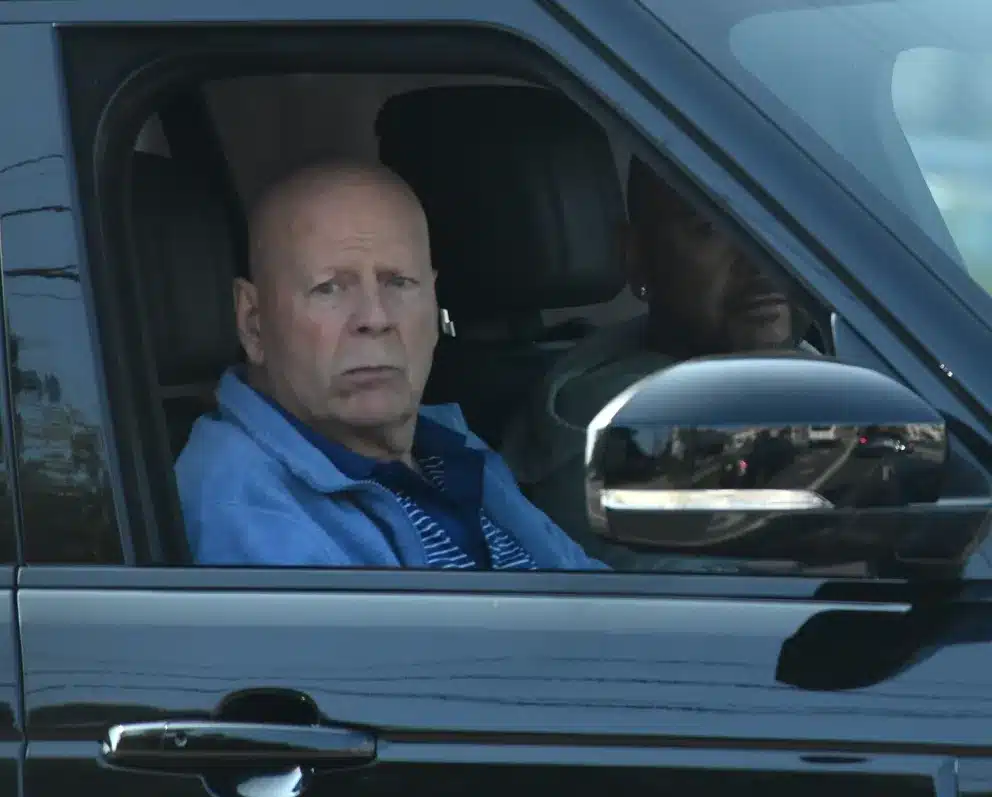A once-indestructible Hollywood legend now faces a cruel, unrelenting decline—and his devoted wife says she made an excruciating choice to protect him and their family. In a tearful ABC conversation with Diane Sawyer that aired August 26, 2025, Emma Heming Willis described the private battle that began when Bruce Willis’ dementia upended their lives.
The earliest signs crept in quietly—missed school drop-offs, longer silences. Bruce, once effortlessly present, started to withdraw. “He would always love taking the girls to school, and then those school runs just started to not happen as much,” Emma recalled. At first she clung to benign explanations—maybe his hearing, damaged years ago filming Die Hard. But hope faded as his speech faltered, misunderstandings piled up, and even a childhood stutter resurfaced. What devastated her most was the emotional distance: “It felt a little removed, very cold, not like Bruce.”
Without answers, their marriage strained in unfamiliar ways. “I didn’t understand what was happening… It doesn’t feel like a marriage anymore,” she said. As the mystery deepened, Emma’s role shifted from partner to caregiver. Practical realities followed. Bruce became highly sensitive to noise, so she canceled playdates and kept the family cocooned for his comfort. “I isolated our whole family… That was a hard time.” Over months, her protective instincts crystallized into what she calls one of the hardest decisions she’s ever made: moving Bruce into a separate home nearby for round-the-clock care in a space designed for his safety.
She’s adamant it was an act of love. “I knew first and foremost, Bruce would want that for our daughters,” Emma said. “He wouldn’t want them to be in a home that was more tailored to their needs, not his needs.” She describes the new setting not as an institution but a sanctuary—warm, structured, and familiar. “We’re there a lot. It’s our second home, so the girls have their things there… a house that is filled with love and warmth and care and laughter.” Friends still visit, bringing “life and fun.” Though cameras weren’t allowed, Sawyer noted Bruce appeared “happy” and “healthy.”
Physically, Emma says, he remains strong. “Bruce is still very mobile… in really great health, overall; it’s just his brain that is failing him.” The language loss associated with frontotemporal dementia has advanced. “Yeah, the language is going,” she acknowledged, adding that the family has adapted with different ways of connecting. One question she meets with certainty: does he still know his family? “I know he does,” she said. “He’s holding our hands, we’re kissing him, we’re hugging him, and he is reciprocating… and so that’s all I need.”
The public first learned in 2022 that Bruce had aphasia; months later came the FTD diagnosis, a disorder that attacks behavior, speech, and memory. Emma has since stepped forward as advocate and protector, channeling grief into purpose. In her forthcoming book, The Unexpected Journey: Finding Strength, Hope, and Yourself on the Caregiving Path (out September 7), she opens a window into caring for someone you’re losing piece by piece. “It doesn’t matter where we came from, who we’re married to… sadness and grief and anger and the resentment… it is one common thread that we all share,” she said. Her message is simple and urgent: no caregiver is alone. As Bruce’s world narrows, she hopes her voice widens a circle of compassion, understanding, and unity.

What do you think of Emma’s decision to move Bruce into a separate home? Could you make the same choice for someone you love?






